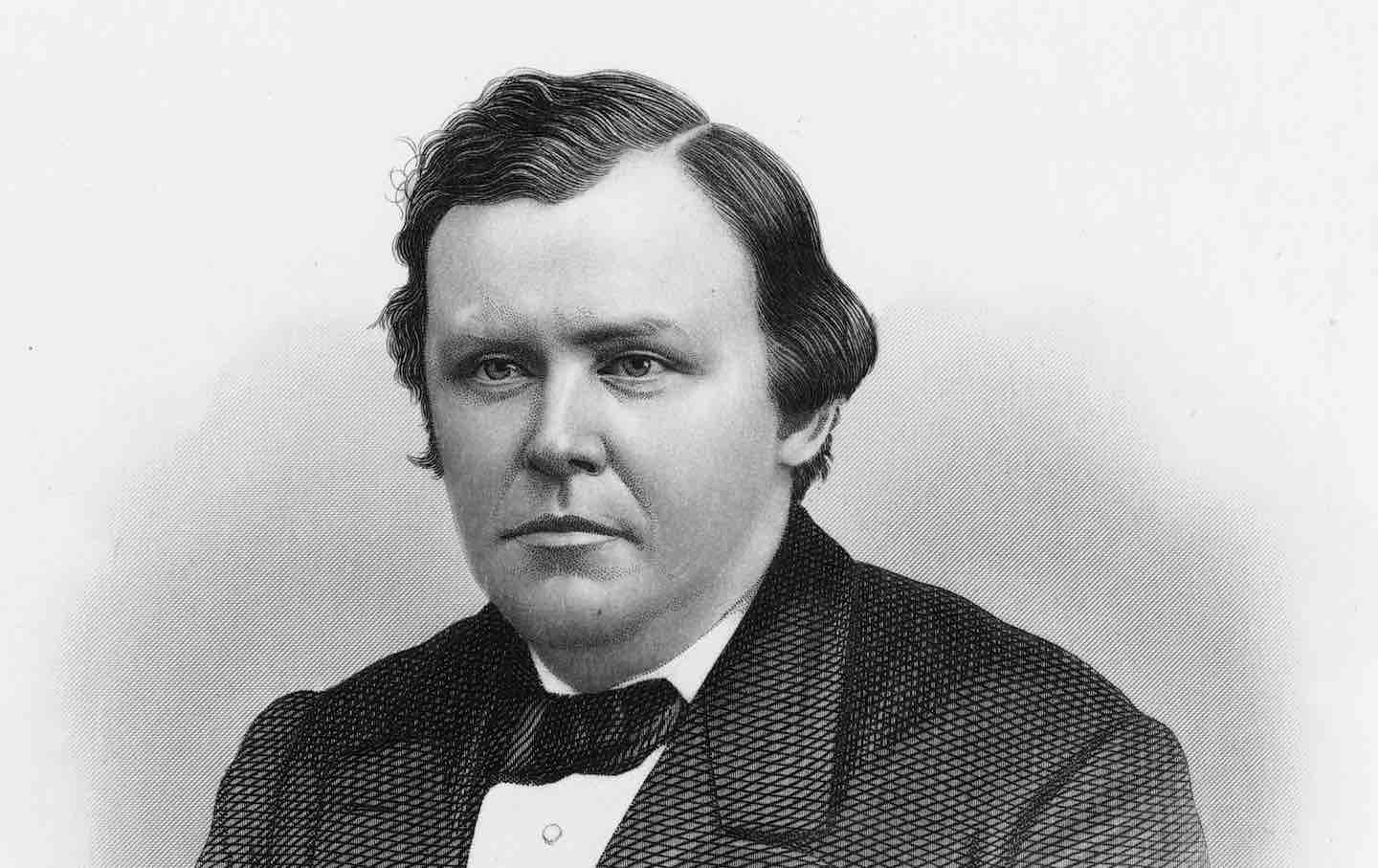Is Comedy Really an Art?
A history of comedy’s last three decades of pop culture dominance argues that it is among the consequential American art forms.

As a woman who spent her 20s in often-dark, sometimes-damp basements waiting for the chance to tell jokes to a sparse audience, I’m fascinated—even scared—by anyone who thinks comedy is cool. Jesse David Fox, the author of the aptly titled Comedy Book: How Comedy Conquered Culture—and the Magic That Makes It Work, is one such person. Chronicling the last 30 years of comedy, his book seeks to explain its evolution and artistic relevance in our culture.
Of course, this is a book about comedy—but personally, I want to know less about the subject. I’m a comedy writer myself, and I’m burned out. I do try to maintain some semblance of work/life balance: I rarely listen to comedy podcasts, watch stand-up specials, or follow industry news. That said, I don’t often hear about comedy from non-comedians, and I found myself fascinated by what Fox had to say. At its core, the book’s purpose is to prove that comedy should be considered an art, as impactful and worthy of critical examination as any other form. Each chapter is a forensic autopsy of a particular aspect of the craft, ranging from the obvious (timing, laughter, politics, audience) to the more subtle and imperceptible (context, truth, connection).
It’s hard to imagine such a book achieving any level of objectivity, since comedy is the sort of entertainment that hinges on subjective experience. Yet Fox achieves an analytic rigor that is notable: He’s genuinely curious about the form’s twists and turns, and he is a true expert on comedy’s contemporary history. When discussing Saturday Night Live, he balances a respect for the show’s unprecedented success with an acknowledgment of its now-obvious (and oft-cited) shortcomings, such as its occasionally unfortunate choice of hosts (Elon Musk, Donald Trump) and the fact that many of the sketches are simply not funny. (“I don’t think you watch SNL because it’s good,” he says at one point.) In his chapter on “Funny,” he brings philosopher and anthropologist Ernest Becker’s The Denial of Death into his explanation of why poop jokes matter. I love Becker, I love poop jokes, and I love how badly Fox wants them to be analyzed and respected.
But he doesn’t just respect comedy; he implores others to do so as well. As Fox writes, “Regularly, people, including comedians, push back on attempts to take [comedy] seriously. Enough. It is serious. Suggesting otherwise inhibits its potential growth and expanse as an art form.” Indeed, his argument is that knowing more about comedy will improve the viewer’s experience, which makes perfect sense to me. However, it’s also clear that he thinks comedy should be considered art for the sake of comedy itself—and, by extension, the comedian. I don’t speak for all comics, but I don’t care whether anyone categorizes my work as art; I’m just trying to keep people entertained.
To be fair to Fox, though, I do think comedy is art; I’ve never heard a compelling argument otherwise. In fact, I was curious about whom exactly Fox was arguing with here until I got to his chapter on “Laughter.” In it, he addresses comedy that isn’t intended to produce laughs. As he writes, “Frankly, if it’s not accepted that there is comedy beyond this one function, comedy will not be able to progress as an art form, or be an art form at all.” He compares comedy that isn’t intended to evoke laughter to chairs you can’t sit on and then asks if they are still chairs. Sure, but that’s beside the point, because the most relevant feature of a piece of furniture is whether or not you want to spend money to put it in your house (in my experience).
In examining Hannah Gadsby’s special Nanette, for example, Fox writes: “I don’t care if you like Nanette, but it is important to me that people accept that it is comedy. To deny that Nanette is comedy is to deny comedy’s potential as an art form.” However, at the end of the chapter, after exploring Dave Chapelle’s 8:46, he asks:
So, is it comedy? I don’t know. Honestly, it is up to you to decide for yourself. Do you want to allow comedy to include moments in culture like this? There is no right answer. This isn’t math. It’s art.
I couldn’t help but wonder if Fox wants comedy to be considered art almost as a safety net for this type of low-laugh-density (i.e., potentially unfunny) comedy. Art has an abstract, intangible value. Comedy has (or historically has had) a tangible value—laughter. I’ve performed countless laughless sets in my day, and while I usually write them off as a “learning experience,” perhaps I’d be happier if I started labeling them “art.” But that would only change my experience, not that of the audience. Here again is where Fox and I differ. I think entertainment is assessed by the person watching: Is it worth their time? Does it matter to them?
I am biased, since along with stand-up, I engage in the type of comedy that is least likely to be considered art: Internet comedy. Perhaps I just got over wanting to be taken seriously as an artist years ago. I don’t care if comedy is art for the same reason I don’t find the term “content creator” offensive, or for the same reason I don’t prefer live comedy to the domain of the Internet, or for the same reason I started doing comedy at all: I just want people to like me.
Fox, for all his reverence for every other type of comedy, does come up a bit short on social media. He’s certainly not the only one to criticize Internet comedy—it’s always frustrated me that in the comedy community, when a comic is successful online but bombs in person, they’re “not funny,” but when a comic kills in person but can’t get traction online, “the algorithms don’t work.” Maybe, just maybe, they’re two separate skill sets.
Fox is not entirely without respect for social media—he acknowledges that it’s brought new fans out to live shows—and much of his criticism, particularly of the joke theft it enables, is valid. However, his regard is limited. As he writes, “Social media platforms are looking for engagement, not passive enjoyment, so someone’s hating your joke and saying so is more valuable than them just liking it.” In talking about online clips, he writes: “Again, it must be stated that it works. But at what cost?” Fox calls the Internet a place for “unfinished jokes”—except, well, a joke is finished when the comedian decides it’s finished. I edit the same joke online three or four times, but I test out revisions of the same joke three or four hundred times in my stand-up, so I’m not sure I’d say online audiences are getting the unfinished version.
Obviously, I know social media is mostly horrible—I live there. But I want to defend it for the same reason Fox wants to defend Nanette: because I think it’s a way to expand the form. Specifically, it’s a way to allow more comedians in. Here are a few types of people who aren’t well-suited to building careers at comedy clubs: sober people, anyone who likes to go to bed early, anyone who doesn’t want or can’t afford to live in New York City or Los Angeles, anyone who doesn’t like to get sexually harassed while they’re working (at least on social media, it comes after you’ve posted), anyone who gets migraines from the spotlights. Fox holds up Ali Wong’s first Netflix stand-up special as an example of a platform letting a fan base find a comedian outside of the white-male-dominated comedy club, but I would argue that social media does this in a larger, more capacious way. If anything, the fact that Ali Wong got a deal with Netflix is proof she was already relatively mainstream by the time her special came out. With social media, you can build a following from nothing.
So while Fox and I may disagree on what type of comedy is most in need of defense, neither of us would be defending it at all if we didn’t know how much it mattered. Comedy doesn’t matter to me because it’s art; it matters to me because it inspires the type of passion that compelled Fox to write this book. By the end of Comedy Book, I still didn’t care about comedy’s classification, but I did remember why I fell in love with it in the first place.
More from The Nation

The Peculiar Case of Ignatius Donnelly The Peculiar Case of Ignatius Donnelly
The Minnesota politician presents a riddle for historians. He was a beloved populist but also a crackpot conspiracist. Were his politics tainted by his strange beliefs?

The Agony of Aaron Rodgers The Agony of Aaron Rodgers
Is he the world’s most interesting athlete or is he just a washed-up crackpot?

Can You Understand Ireland Through One Family’s Terrible Secret? Can You Understand Ireland Through One Family’s Terrible Secret?
In Missing Persons, Clair Wills's intimate story of institutionalized Irish women and children, shows how a family's history and a nation’s history run in parallel.

Peter Schjeldahl’s Pleasure Principle Peter Schjeldahl’s Pleasure Principle
His art criticism fixated on the narcissism of the entire enterprise. But over six decades, his work proved that a critic could be an artist too.

How the Western Literary Canon Made the World Worse How the Western Literary Canon Made the World Worse
A talk with Dionne Brand about her recent book, Salvage, which looks at how the classic texts of Anglo-American fiction helped abet the crimes of capitalism, colonialism, and more...

Along the Roads That Built Modern Brazil Along the Roads That Built Modern Brazil
José Henrique Bortoluci's What Is Mine tells the story of his country’s laborers, like his father, who built its infrastructure, and in turn its fractious politics.


